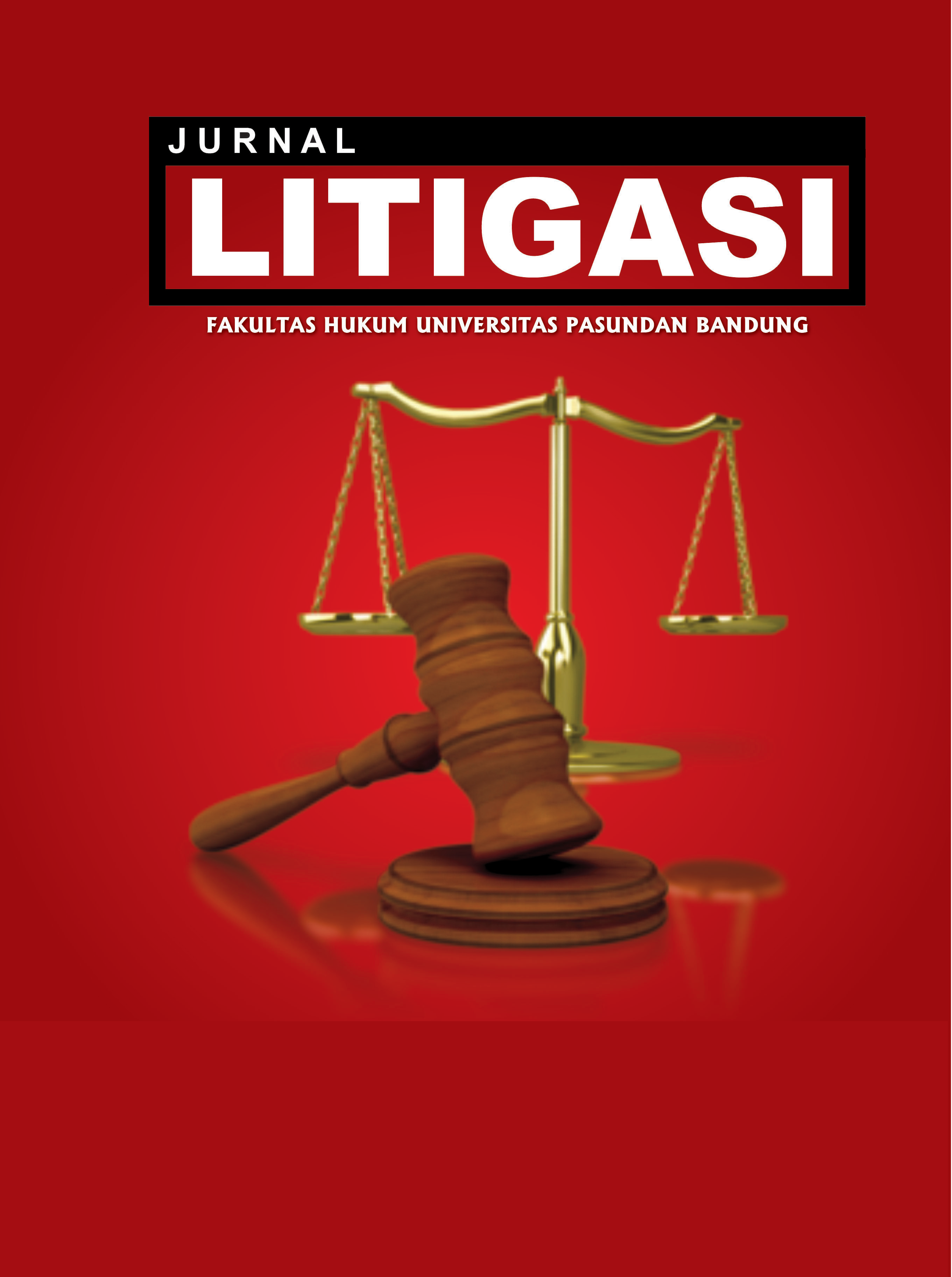IMPLIKASI PENGATURAN PELANGGARAN HAM BERAT DALAM KUHP 2023 TERHADAP KEBERLAKUAN ASAS-ASAS KHUSUSNYA: PENGUATAN ATAU PELEMAHAN?
DOI:
https://doi.org/10.23969/litigasi.v25i1.12416Abstract
This paper discusses the impact of the regulation of gross violation of human rights in the Penal Code 2023 on the validity of the principles stipulated in Act Number 26, 2000 as the special law. The method used is normative research with data collection through literature study. The findings show that regarding the Article 187 and Article 620 of the Penal Code 2023, it can be said that these articles have actually provided a ‘guarantee’ to ensure that the existence of the Penal Code 2023 will not reduce or have any impact on the special principles in Act Number 26,2000. This is then strengthened by the provisions of Article 622 paragraph 1 letter m which only revokes several articles from the Act, namely Articles 8, 9, 36-40 on criminal offenses and sanctions for gross violation of human right. By using the theory of codification & the amendment of Article 3 of the Penal Code 2023, it was revealed that the regulation on gross violation of human right in the Penal Code 2023 is potentially to create new problems, from the issue of conflict of principles to of multiple interpretations. Different interpretations of Article 187, Article 620, and Article 3 of the Penal Code 2023 can actually lead to the inapplicability of special principles stipulated in Act Number 26, 2000, therefore, the provisions of gross violation of human right, in the future, are very likely to be subject to the general principles contained in Book I of the Penal Code 2023.
Downloads
References
Abidin, Zainal. (2007). Pengadilan Hak Asasi Manusia di Indonesia: Regulasi Penerapan dan Perkembangannya. Jakarta: ELSAM.
___________ & Supriyadi Widodo E. (2017). Degradasi Extraordinary Crimes: Problematika Perumusan Kejahatan Genosida dan Kejahatan terhadap Kemanusiaan dalam RKUHP. Jakarta: ICJR.
Adji, Indriyanto Seno. (2016). Asas Retroaktif, Nonpersuasi terhadap Korupsi, Harian Kompas.
Arsil, et.al. (2019). Membedah Konstruksi Buku I Rancangan KUHP. Jakarta: Sekolah Tinggi Hukum Indonesia Jentera.
Atmasasmita, Romli. (2002). Pengadilan Hak Asasi Manusia dan Penegakannya di Indonesia, Jakarta: Perum Percetakan Negara RI.
Badan Pembinaan Hukum Nasional RI. (2003). Seminar Hukum Nasional Pertama Tahun 1963 Buku Ke-1. Jakarta: Percetakan Negara RI.
_______________________________. (2012). Laporan Akhir Naskah Akademik Rancangan Undang-Undang Perubahan UU No. 26 Tahun 2000 tentang Pengadilan Hak Asasi Manusia. Jakarta: Kemenerian Hukum dan Hak Asasi Manusia Republik Indonesia.
_______________________________. (2015). Naskah Akademik Rancangan Kitab Undang-Undang Hukum Pidana (KUHP). Jakarta: Kementerian Hukum dan Hak Asasi Manusia Republik Indonesia.
Bassiouni, M. Cherif. (1999). INTERNATIONAL CRIMES: JUS COGENS AND OBLIGATION ERGA OMNES. 59 (4). 68.
Boas, Gideon, et.al. (2012). International Criminal Justice: Legitimacy and Coherence. UK: Edward Elgar Publishing Limited.
Brezeanu, Petronela Simona. (2022). NON-APPLICABILITY OF STATUTORY LIMITATIONS- THE ANTIDOTE OF THE PRESCRIPTON OF CRIMINAL LIABILITY. 172-176 .doi: 0.5281/zenodo.6950710.
Chazawi, Adami. (2014). Pelajaran Hukum Pidana I. Jakarta: Raja Grafindp Persada.
Cnossen, Jelle. (2017). Een Essentiele Schakelbepaling in Het Materiele Straftecht, Netherland.
Dewi, Yustina Trihohi Nalesti. (2017). INDONESIA’S HUMAN RIGHTS COURT: NEED FOR REFORM. 18 (1). 28-47. doi: https://doi.org/10.1163/15718158-01801002.
Expert Group on the Codification of the Criminal Law. (2004). Dublin: the Stationery Office.
Hiariej, Edward Omar Sharif. (2009). Asas Legalitas dalam Pelanggaran Hak Asasi Manusia yang Berat. Disertasi. Program Pascasarjana Universitas Gadjah Mada.
ICRC. (2021). General Principles of International Criminal Law. Switzerland: ICRC.
Jaya, Nyiman Serikat Putra. (2008). Beberapa Pemikiran Arah Pengembangan Hukum Pidana. Bandung: PT.Citra Aditya Bakti.
J.G.H, Altena.(2016). Het legaliteitsbeginsel en de doorweking van Europess recht in het Nederlandse materiele straftrecht. Disertasi. Leiden University.
Klamberg, Mark. (2017). Commentary on the Law of the International Criminal Court. Brussels: Torkel Opsahl Academic EPublisher.
KontraS. (2016). Bahan Advokasi Pelanggaran HAM Berat Masa Lalu. Jakarta: KontraS.
Marzuki Suparman. (2011). Tragedi Politik Hukum HAM. Yogyakarta. Pustaka Pelajar.
Neier, Aryeh. (2012). The International Human Rights Movement: A History. USA: Princeton University Press.
Rawls, John. (2006). Teori Keadilan. Yogyakarta: Pustaka Pelajar.
Remmelink, Jan. (2014). Pengantar Hukum Pidana Material 2: Penuntutan dan Penegakan Hukum Pidana. Jakarta: Gramedia Pustaka Utama.
Sasmito, Joko. (2017). Konsep Asas Retroaktif dalam Pidana: Pemberlakuan Asas Retroaktif pada Tindak Pidana Pelanggaran HAM di Indonesia. Malang: Setara Press.
Schabas, William. (2014). An Introduction to International Criminal Court, UK: Cambridge University Press.
_______________. (2016). Rome Statute of the International Criminal Court: A Commentary. Munich, Oxford, Baden Baden.
Simatupang. Abdi Nelson. (2017). PERAN COMMISSION OF TRUTH AND FRIENDSHIP DALAM NORMALISASI HUBUNGAN BILATERAL INDONESIA-REPUBLIK DEMOKRATIK TIMOR LESTE. 4(2). 1-15.
Simons. (1937). Leerboek Van Het Nederlandsche Straftrecht. Groningen: P.Noordhoof, N.V.
Soeprapto, Enny. (2007). Berbagai Permasalahan dalam UU No. 26 Tahun 2000 tentang Pengadilan HAM dan Dampaknya pada Proses Penyelidikan, Disampaikan Dalam Pertemuan Orientasi tentang Penyelidikan Pelanggaran Hak Asasi Manusia yang Berat menurut UU No. 26 Tahun 2000. Bogor.
Sudarto. (1987). Hukum Pidana. Semarang: FH Undip.
Suseno, Franz. (2009). Etika Politik Prinsip-Prinsip Moral Dasar Kenegaraan Modern. Jakarta: Gramedia Pustaka Utama.
Tumpa, Harifin. (2010). Peluang dan Tantangan Eksistensi Pengadilan HAM di Indonesia. Jakarta: Kencana Prenada Media Group.
Commission on Human Rights: Report on the Fourth Special Session Tahun 1999.
Report of International Commission of Inquiry on East Timor to the Secretary General Tahun 2000.
Statuta Roma Tahun 1998.
Security Council Resolution 1264 Tahun 1999.
The Princeton Principle on Universal Jurisdiction 2001.
Undang-Undang Nomor 26 Tahun 2000 tentang Pengadilan Hak Asasi Manusia.
Undang-Undang Nomor 12 Tahun 2011 tentang Pembentukan Peraturan Perundang-Undangan.
Downloads
Submitted
Accepted
Published
How to Cite
Issue
Section
License
Copyright (c) 2024 LITIGASI

This work is licensed under a Creative Commons Attribution-ShareAlike 4.0 International License.
Copyright © 2026 Jurnal LITIGASI (e-Journal).
Jurnal LITIGASI (e-Journal) adopts the CC-BY license as the optimal license for publishing, distributing, using, and reusing scholarly work. Authors who publish with this journal retain copyright and grant the journal right of first publication with the work simultaneously licensed under a Creative Commons Attribution 4.0 International License (CC-BY 4.0). This license allows others to share, copy, distribute, and adapt the work, provided that the work's authorship and initial publication in this journal are properly cited.






























